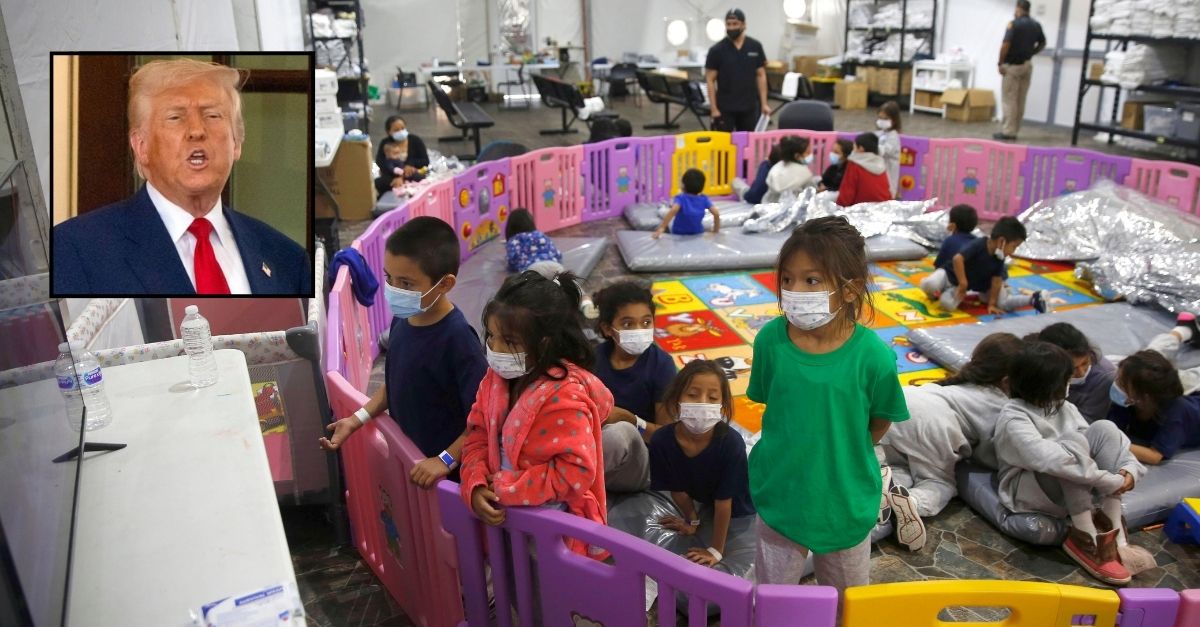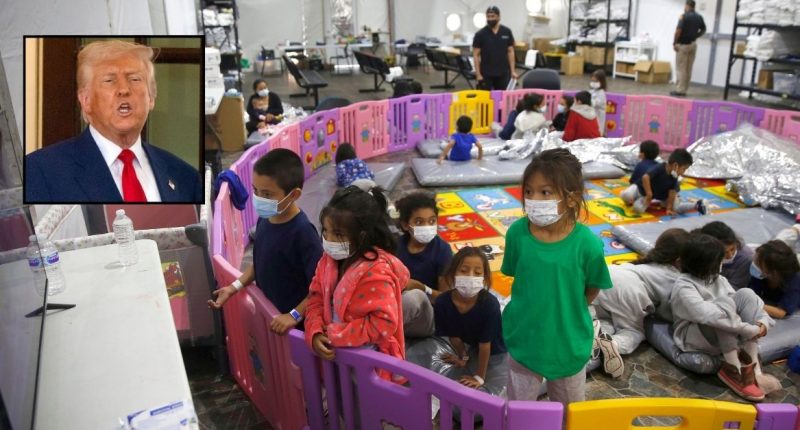
Background: FILE — Unaccompanied migrant minors aged 3 to 9, watch a television monitor inside a playpen at the U.S. Customs and Border Protection facility, the main detention center for unaccompanied children in the Rio Grande Valley, in Donna, Texas, on March 30, 2021 (AP Photo/Dario Lopez-Mills, Pool, File). Inset: Donald Trump leaving the West Wing of the White House, Monday, April 7, 2025, in Washington (AP Photo/Mark Schiefelbein).
A panel of federal appeals court judges in California took less than a day to reject the Trump administration‘s request that the entire judicial panel hear its emergency request to lift a block on funding cuts to legal representation for unrepresented child migrants.
“The petition for rehearing en banc is denied on behalf of the court,” the one-sentence ruling said. No dissents were filed. The three-judge panel consisted of Senior U.S. Circuit Judge A. Wallace Tashima, a Bill Clinton appointee; U.S. Circuit Judge John B. Owens, a Barack Obama appointee; and U.S. Circuit Judge Roopali H. Desai, a Joe Biden appointee.
The decision comes in the case of Community Legal Service in East Palo Alto v. U.S. Department of Health and Human Services. According to the plaintiffs’ complaint, filed on March 26 in federal court in northern California, the agency, led by Robert F. Kennedy Jr., along with the department’s Office of Refugee Resettlement and the U.S. Department of the Interior, cut funding for attorneys representing unaccompanied children in immigration proceedings.
Those cuts were announced on March 21, “without warning,” according to the complaint, by way of a “notice terminating the contract line items through which Defendants HHS and ORR had provided funding for counsel for unaccompanied children and ordering Plaintiffs to ‘immediately stop work’ on their ongoing funded representations.”
The complaint alleges that the funding cuts violate a 2008 statute called the Trafficking Victims Protection Reauthorization Act (TVPRA), in which Congress mandated that the government “‘ensure, to the greatest extent practicable,’ that all unaccompanied children receive legal counsel to represent them in ‘legal proceedings’ and to ‘protect them from mistreatment, exploitation, and trafficking.””
In the complaint, the plaintiffs — a group of nonprofit immigrant rights organizations — argued that Congress, not a president’s administration, had made the determination to provide legal representation to unaccompanied minor immigrants, and emphasized that this commitment hadn’t wavered prior to the Trump administration.
“For more than a decade, until March 21, 2025 — under different presidential administrations and changing immigration policies — the government fulfilled its obligations under the TVPRA and ongoing congressional appropriations to fund representation for unaccompanied children,” the complaint says. That representation “helped bridge the significant gap in legal access for unaccompanied children, only a small number of whom can afford paid representation or are able to independently retain a pro bono attorney.”
The funding also “helped immigration courts function efficiently” by not forcing judges and government lawyers to “engage directly with children in responding to immigration charges and related questions around relief from removal.”
On March 27, plaintiffs filed their request for a temporary restraining order.
“Terminating funding for these legal services has devastating and irreparable effects on Plaintiffs, which are all the more devastating for the harm they will do to UCs,” the motion says, using shorthand for the “unaccompanied children” who receive their services. “Even if Defendants reinstate funding for counsel for UCs at some unknown future time, the providers’ funded children’s legal programs and the UCs that depend on their vital counsel will have already been dealt a fatal blow via mass layoffs of staff for the nonprofits and private providers, and prolonged government custody or deportations for the children — including children who could have raised valid claims to lawful immigration status.”
The indication that unrepresented children with valid claims could have been deported mirrors the ongoing battle over mass deportations of adults from Venezuela to a notorious prison in El Salvador, an issue that has already reached the Supreme Court and continues to be the focus of contentious federal legal battles.
On April 1, U.S. District Judge Araceli Martinez-Olguin, a Joe Biden appointee, granted the TRO request, finding that “the balance of equities tips sharply toward the Plaintiffs and the public interest strongly weighs in favor of entering temporary relief.” The judge extended the TRO on April 10 and ordered further briefing and hearings, as the plaintiffs alleged that the government wasn’t complying with the court’s order. On April 12, the health department appealed to the 9th U.S. Circuit Court of Appeals — an appeal the three judges denied on procedural grounds.
“We conclude that the temporary restraining order is not appealable,” the judges wrote on April 18 in response to the department’s April 14 motion to stay the TRO. “We therefore dismiss this appeal and deny the emergency motion.”
According to the federal docket, the judges had signaled their likely conclusion the day after the motion to stay was filed.
“The district court’s temporary restraining order may not be appealable,” the docket order said. The judges cited case law noting that TROs normally stay in effect for only 14 days, absent an extension granted by the judge, and the “limited duration of a TRO can also render an appeal moot — a jurisdictional concern — when the order expires or is supplanted by a preliminary injunction.”
Love true crime? Sign up for our newsletter, The Law&Crime Docket, to get the latest real-life crime stories delivered right to your inbox.





